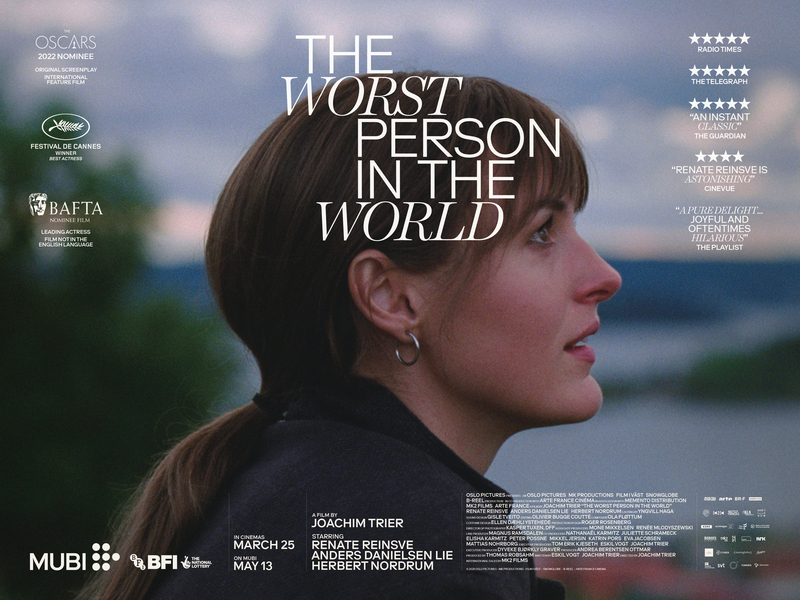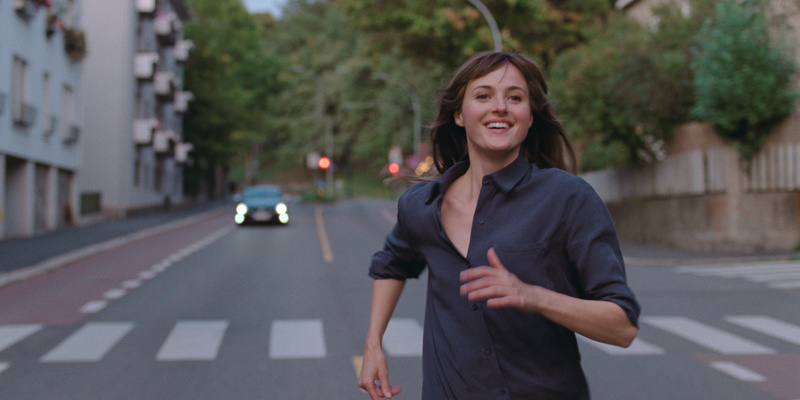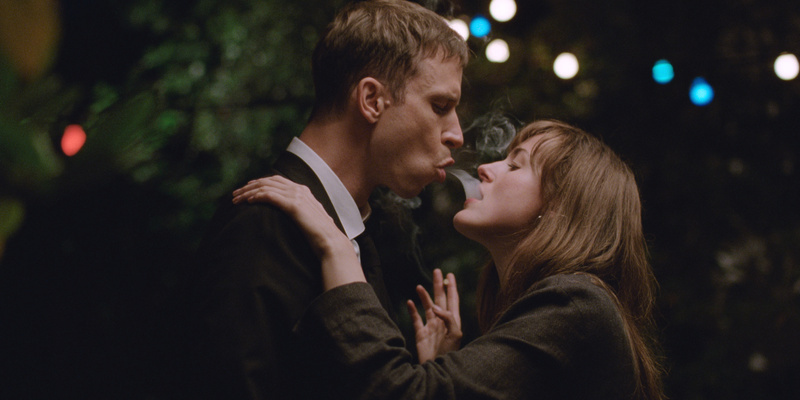
Review by
Eric Hillis
Directed by: Joachim Trier
Starring: Renate Reinsve, Anders Danielson Lie, Herbert Nordrum, Hans Olav Brenner, Helene Bjørneby

It's a sad truth that in order to live your own life you need to
indulge in a degree of narcissism. The path you follow to achieve your
own contentment may result in disappointing others. For most of us, it
begins with letting down our parents, for how many of us truly become
the person our parents wished for? Then, throughout life, we find
ourselves faced with remaining in loveless relationships or telling
others that we may not share their affection. Some of us might even have
to neglect our spouse and children in order to achieve our career
goals.
People who choose not to indulge in such narcissism are often regarded
as heroes in our culture. Until relatively recently, religions had
programmed us into believing that we should stick with a relationship no
matter how miserable it makes us. The aftertaste of such thinking still
lingers on in those people who view you with suspicion if you're over 30
and haven't either gotten married or had children. It's bad enough if
you're a bloke, but if you’re a childless woman with no significant
other over a certain age you're viewed like some sort of witch, and it's
assumed you must be self-centred at best, sociopathic at worst.

For those of us who have no interest in raising children and find it
difficult to maintain relationships, for those of us who are above a
certain age yet still haven't quite figured out what our purpose really
is, Joachim Trier's
The Worst Person in the World is a movie that embraces us
and tells us that while it's not going to be exactly alright, it at
least understands us.
The film is centred around Julie (Renate Reinsve), the sort of
young woman whose friends might describe as a "trainwreck" behind her
back. Except Julie doesn't even have friends. After an early montage
that details her indecisiveness in flitting between various college
courses, Julie finds herself living with Aksel (Anders Danielsen Lie), a fortysomething comic book artist. Julie is attracted to his
outspokenness and intellectualism, but she's turned off by his desire to
have children. This leads her into the arms of the likeable if
superficial Eivind (Herbert Nordrum), but soon she finds she has
little in common with him. Perhaps what Julie needs is an amalgam of
Aksel and Eivind, a thinking man who will share her spontaneity.

Much of Trier's film sees its characters negotiating the expectations
put upon young liberals in the current era. While flirting with becoming
a writer, Julie pens an essay entitled "Oral Sex in the Age of #MeToo,"
which tackles the difficulty of claiming to be a feminist while enjoying
giving pleasure to men. To follow her own path, feminism is something
else Julie may have to disappoint. Eivind has a similar dilemma as an
environmentalist. He leaves his girlfriend Sunniva (Maria Grazia Di Meo) for Julie because Sunniva's obsession with saving the planet becomes
so suffocating that Julie's narcissism is freeing by comparison – he has
nothing to live up to in Julie's presence, or so he initially believes.
Aksel represents the contradictions of being an artist known for
provocative work and now receiving more criticism from liberals than
conservatives.
Yet while Trier indulges in such heady themes, he does so in a manner
that's always amusing, and he pulls several tools from his cinematic bag
of tricks that make The Worst Person in the World stand
out from its visually uninspired mumblecore cousins. In one bravura
sequence, Julie imagines freezing time like the woman from that
Twilight Zone episode and runs through the streets of Oslo
into Eivind's arms. With everyone suspended in time around them, the
pair spend a full day together, with nobody else in their lives any the
wiser. A comic highlight sees the film's narrator take us back through
several generations of the women in Julie's family to illustrate how
each generation has become less focused on simply living to breed
children.

Reinsve is a winning presence, attractive enough to be a movie star but
relatable enough to have realistic insecurities. A creation of two male
writers (Trier and his co-writer Eskil Vogt), Julie betrays the
modern myth that you can only write characters whose shoes you've walked
in. Women may relate slightly more to Julie, and perhaps will be more
likely to seek out Trier's film, but this male viewer found himself
represented by Julie more than many other characters in recent cinema,
of either gender. Like Julie, I've chosen a life path that's led me to
appear solipsistic in the eyes of outsiders, shunning forming a family
in order to follow career goals, and it's refreshing to see myself
embodied in a movie that doesn't make me feel bad for enjoying my own
company. Like Julie, I've disappointed my parents, I've hurt people's
feelings, and I don’t care about my planet as much as maybe I should.
But I'm not the worst person in the world, am I? At least one filmmaker
in Scandinavia believes I may not be.

The Worst Person in the World is on MUBI UK now.

